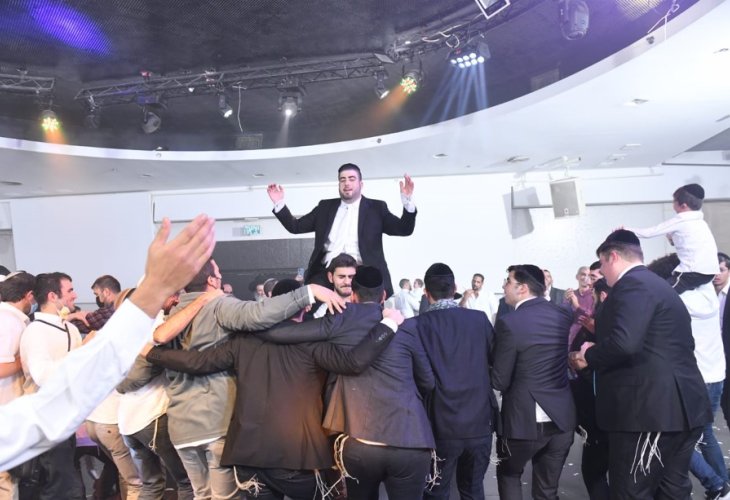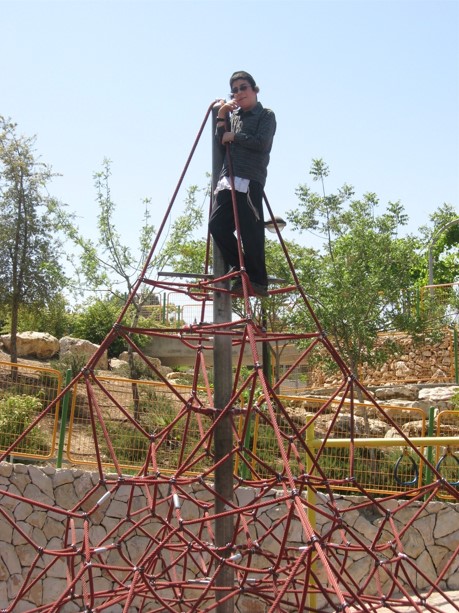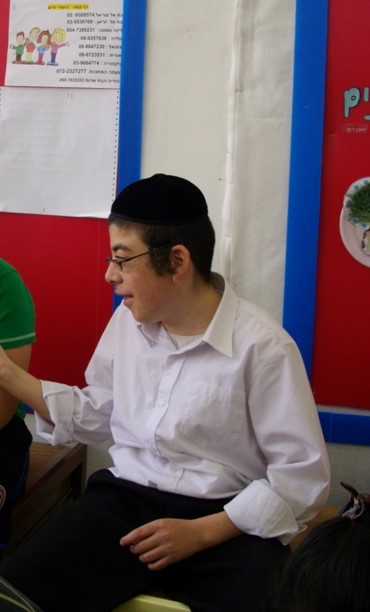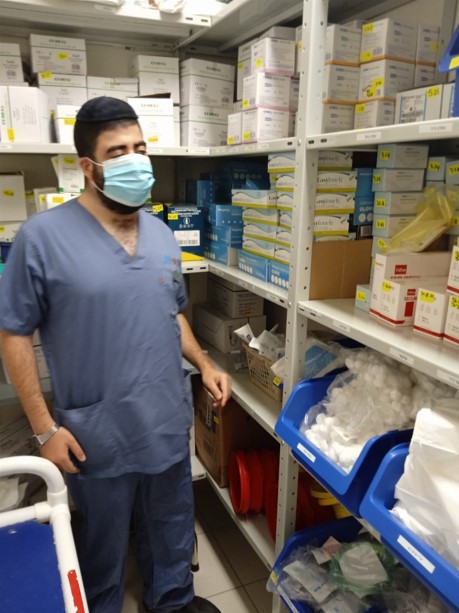At My Wedding People Cried, They Couldn't Believe I Would Get Married
Jonathan Zarviv grew up with medical challenges and visual impairment. After moving between institutions, he found his place at the Blind Home Education. In an emotional conversation, he describes his journey, reactions, the way people looked at him, finding a job, and the highlight - the wedding. 'I am an example that after darkness comes light, there is always a chance'
 Jonathan's Wedding (Photo: Reuven Edri)
Jonathan's Wedding (Photo: Reuven Edri)"It wasn't a given, not at all." When Jonathan Zarviv says this, he's talking about his wedding which took place a few weeks ago - a wedding that was uniquely joyous, and unsurprisingly so. "People had lights in their eyes," he describes. "When I exited the yichud room, I felt they were just waiting to get up and dance, no one remained seated around the tables..."
Jonathan was born visually impaired and led a life filled with challenges—both medically and coping with the disability. "People didn't believe I would establish a home, it was joy unparalleled, and honestly, there were stages in life when I thought it would never happen."
As a fresh and happy groom, he shares his life story, a story of inspiring perseverance and immense willpower. "I want to give strength to people," he says, "to show that even with a tough limitation—there is always a chance, you just need to believe in yourself and aspire."
Childhood of Challenges
In his late 20s, Jonathan, who was born in Jerusalem as the second of 17 children, notes, "I'm the only one in the family with a visual impairment. It's a congenital condition. It's not that I can't see at all, but my eyesight is very limited. In sunlight, it's really hard for me to see, yet even in a shaded room, I can only see short distances."
Until the age of six, he also dealt with various medical issues, including a kidney tumor, which, after treatment, left him with only one kidney. "I mainly remember my early childhood within hospital walls," he notes, "there were many hospitalizations and doctors, not many regular visits to kindergarten or playing with friends. Around age six, I moved with my family to Beit Shemesh and was placed in a regular Talmud Torah, in a class for children with special needs. My parents, exceptional individuals, did everything in their power to make things good for me, but ultimately, it wasn't really dependent on them, because there were so many things I wanted to do as a child—run, climb, romp, be like every other kid, and I couldn't."
At what stage did you start understanding that you are different from other children?
"There's no specific moment when it happened, it’s a feeling that’s been with me as far back as I can remember, but the time I started feeling the difficulty and the pain was when I noticed people seeing me and looking back into my eyes. Mostly kids, but also adults. They looked at me intensely, and then I realized it was not only that I was different, but also strange and intriguing, something unusual not seen every day."
 Jonathan in his childhood
Jonathan in his childhoodAnd how did you feel with this realization?
"As a child, I felt awful. I remember asking the kids outside the synagogue to let me join their play, and they refused, claiming 'I didn’t see well.' It caused me much crying and frustration. My parents, as mentioned, tried to help me, but they couldn't. By the way, to this day, it hurts when people and kids stare at me. It’s no longer the same terrible feeling I had as a child, but it's still unpleasant. Even when a small child looks at me today, I feel my heart pinch."
Learning and Gaining Independence
After a few years in regular society, Jonathan's parents concluded they wanted to transfer him to another educational institution. "My parents heard about the Blind Home Education," Jonathan shares, "and consulted with Rabbi Bazri about sending me there. The rabbi asked them to tell him about the place, and when they explained that in addition to regular studies, there are also real-life preparations like home economics classes, mobility, independence, and such, he ruled that 'derech eretz precedes Torah'. He also explained to my parents that at the Blind Home Education, they will cultivate your son into a person with derech eretz and values, capable of independently facing life. After that, you can send him wherever you want."
Looking back, Jonathan says there was no wiser decision. "Today, more than 15 years later, I know that the transition to the Blind Home Education is what built me and shaped my character because only from that moment did I begin to develop. It wasn't easy because studies at the Blind Home Education can be grueling. They start in the morning with a pampering meal, followed by several hours of regular studies—math, English, history, and other subjects. The classes are not divided by age but by learning level, so I could, for example, be in a class with children aged 14 and also with 17-year-old youths. Since all the children had some form of visual impairment, teachers used various aids to help us read from the board or textbooks. For those who couldn’t see at all, they used Braille, and for others, they used large print textbooks, special lighting, and other tools. Personally, much of the work was done on my writing skills. Although I could read, I struggled with writing, and the only word I could write when I entered the school was 'Jon'. My writing ability improved significantly in a short time."
"In general, the studies were very demanding, requiring us to exhaust all capabilities, leaving no room for giving up, yet they tried not to make students learn subjects that wouldn’t genuinely aid them in life. For instance, I struggled with math and English, so they let me study just the minimum, whereas in history classes I excelled, I completed a 5-unit matriculation."
When you were with kids like yourself, did you no longer feel different?
"At the Blind Home Education, there was no difference; I felt equal among equals. To this day, my best friends are from there. But on the other hand, I felt lonely when I came home, and in the afternoons and on Shabbat, I had no one to play with in the neighborhood. I didn’t know the local kids; my friends were solely from school."
 Picture from Blind Home Education
Picture from Blind Home Education"I Always Believed - in Hashem, and Also in Myself"
Jonathan notes that as the years passed, the personal struggle grew. "As I matured, I faced larger, more significant challenges. For example, when I couldn't get a driver's license, or when I realized it wasn't clear I could study the profession I wanted or find suitable employment. Regarding starting a family, I was realistic and didn’t know who would marry me. These were questions that constantly accompanied me and troubled me greatly."
What gave you strength during those times?
"Studies at the Blind Home Education are accompanied by professionals and social workers, so I had someone to lean on when needed, but over time, I started understanding that, ultimately, these are my personal life and I cannot just rely on others. I learned that I must take responsibility for myself, and if I don’t ensure my own well-being and feel I’m fulfilling my potential, no one else will do it for me. I think it was exactly at this stage when the moment of reconciling with my visual impairment arrived. I stopped constantly thinking about my limitation and learned to rise above it, set it aside, and continue life as usual."
The great challenge came at age 19 when he first began integrating into various workplaces. "Not everywhere wanted to hire me, and I started feeling humiliation and depression again. But then I simply paused and started showing myself the excellent skills I have – yes, I have a vision impairment, but I am diligent, with a strong work ethic and physical strength, and a good understanding. I have things other workers don’t have." This gave me the courage to offer myself in a number of places. Later, when there was a workplace that 'agreed' to employ me just without payment, I rose above the insult and simply parted ways to find another job. It was amazing to see how the moment I stopped seeing myself as pitiable, others’ perspective changed as well."
Today Jonathan works at Misgav Ladach Hospital as an aid staffer in the Day Hospitalization Department. "I am responsible for the logistical and operational area. It’s hard work, but fun, and every day I arrive there, I’m truly happy," he says. "I can genuinely see, in retrospect, how Hashem led me in the most suitable path for me."
As a religious person, do you think it's easier for you to cope with the disability?
"Obviously, faith strengthens me, but it's impossible to say questions don’t arise, especially as a believer. During the period when my employment situation was uncertain, I constantly wondered why Hashem brought me to this place, why He prevents employers from hiring me, and what He wants from me? Should I turn to factories for special populations? And it's clear they’re not up to my level, and so on. I raised these questions to my chavruta, and he strengthened me greatly. In every conversation, he instilled more and more insights on the subject, until I finally understood there's no need to worry because there is someone in heaven leading me. It's not an instant understanding; it's a lifelong effort, but today, due to the difficulty, I feel much more connected to the Master of the World."
And he wishes to mention something else: "Although I didn’t have the merit to grow up in yeshivot, the strong education I received at home influenced me all the time, leading me to believe in myself too. In difficult times, I remind myself that it’s really not easy, I am limited and will continue to be limited in the future, facing challenges and tough moments, but I have the ability to overcome and move forward, and at that moment, I already feel above the limitation."
 Jonathan Zarviv at his workplace
Jonathan Zarviv at his workplace"At the Wedding, I Felt I Had Won"
Naturally, the topic of matchmaking occupied Jonathan quite a bit. "People knew it was better not to mention this subject to me," he remarks, "because although I aspired all my life to establish a home, it was important to me to marry someone without visual impairments, and I was afraid I wouldn’t find someone suitable. My feeling was initially as though I had to come from a point of compromise, and I didn't wish to."
"After the match was miraculously formed, and we saw things warming up, we did Dor Yesharim tests, revealing that I might pass on the genes of the impairment. It stressed me greatly, and I thought maybe it's really better to break everything. It took time until I strengthened greatly in faith and also understood that today’s world offers various solutions. Most importantly, I am sure that from where I come, I can give my children much more strength to face life, for every child needs a strong parent behind them."
Jonathan kept the evolving match a secret for a long time. "Perhaps four people in the world knew about it before the engagement," he says. "Everyone else only knew I was in a state of frustration and better not to talk about matchmaking with me. Only after the parents met and agreed, I finally allowed myself to spread the news, and I felt the whole world was shaking—literally. I received a flood of phone calls, and for a long period, I couldn’t stop hearing excited reactions around me. When I arrived at the synagogue, all the worshippers danced, and family members simply cried. At some point, I paused and asked myself, 'Why is everyone so shocked? Did they really not give me a chance to get engaged?' But then I reminded myself that even I hardly believed along the way, because truly it wasn't a given at all."
Jonathan takes a deep breath before adding: "When asked if we had a 'regular' wedding, I answer no. We didn't have a regular wedding, but the happiest wedding I’ve seen in my life. I think there's not a person who knew me and didn’t come to the wedding, even the drivers who drove me from Beit Shemesh to Jerusalem came. Just a few days ago the photos arrived, and as I flipped through them, I saw so much joy and the support of people, really feeling like it was Hashem's wedding. My personal feeling is that I won, now I am just like a regular person."
And he has a message for others: "We all face trials; life is not easy for anyone, but it's important to remember that after the darkness comes the light. You just have to believe and pray for it."

